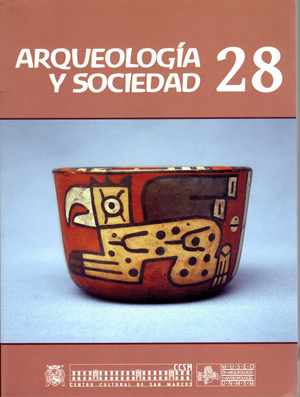WORKSHOP SYSTEM IN ARCHAEOLOGY BASIC EDUCATION
DOI:
https://doi.org/10.15381/arqueolsoc.2014n28.e12250Keywords:
Archaeology, anthropology, ethnology, pedagogy, petroglyphs, rock art, pre-Columbian, learning unit, archeology workshops.Abstract
The course of history Prehispanic Peru in primary and secondary levels of Basic Education , by having a large amount of information, must not only be theoretical, needs to be complemented with visits to museums and archaeological sites where students may come into direct contact with those elements that they can afford archaeological using manipulation and observation to describe, compare, analyze and understand its functionality, techniques used in its preparation, degree of difficulty and the possible thought that men and women had to time of its preparation. This analysis allows us to conduct a more comprehensive learning, that through experimentation can better understand the process of cultural development of ancient peoples. To do so requires the knowledge of some basic methods and techniques of archeology, especially experimental and through this you can make reproductions of various archaeological materials with the same techniques and the same or a similar raw materials used at the time of processing. So that the use of basic knowledge in archeology serve as an educational resource in schools in the primary and secondary levels. The objectives are to improve the level of teaching-learning during Peru's pre-Hispanic history, students develop identity through knowledge, respect and appreciation of cultural elements of the ancient Peruvians, recover ancient craft techniques in the development of pre-Hispanic instruments and art performances to extinction, teach assessing the use of natural resources or raw materials found in our environment, create a taste for research in the field of history and archeology, make reproductions of instruments or demonstrations prehispanic art through the use of existing material in the environment. The workshops are lithic industry, rock art, petroglyphs, fibers, textiles and ceramics.Downloads
Published
Issue
Section
License
Copyright (c) 2014 Ángelo Valderrama Zavala

This work is licensed under a Creative Commons Attribution-NonCommercial-ShareAlike 4.0 International License.
THE AUTHORS RETAIN THEIR RIGHTS:
a. The authors retain their trademark and patent rights, and also on any process or procedure described in the article.
b. The authors retain the right to share, copy, distribute, perform and publicly communicate the article published in the Arqueología y Sociedad (for example, place it in an institutional repository or publish it in a book), with an acknowledgment of its initial publication in the Arqueología y Sociedad.
c. The authors retain the right to make a subsequent publication of their work, to use the article or any part of it (for example: a compilation of their works, notes for conferences, thesis, or for a book), provided that they indicate the source. of publication (authors of the work, journal, volume, number and date).






